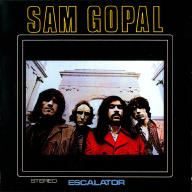The group didn't last, and the following year Gopal organized an eponymously named quartet with ex-Rockin' Vickers bassist Lemmy (guitar/vocals), Roger D'Elia (guitar), and Phil Duke (bass). This quartet recorded a whole LP, entitled Escalator, on the Stable Records label, as well as a single, Horse b/w Back Door Man, and the band was good enough to gain the attention and services of Robert Stigwood as its manager. The first Sam Gopal group and lineup lasted only a year, and in 1969 he recruited a new lineup, with Alan Mark (vocals), Mox Gowland (harmonica, flutes), Micky Waller (guitar), and Freddie Gandy (bass), who cut a few more tracks for Stable but didn't last in that configuration. They later changed their name to Cosmosis and came under the managerial wing of Peter Grant -- somehow, however, they never made it onto the roster of Swan Song Records, despite their connection to Led Zeppelin by way of Grant, who brought in Bernie Holland (guitar). And any momentum that they might have had was lost when Gopal himself was involved in a car accident that left him incapacitated for a couple of years.
Gopal did get to record an album during this period, entitled Building B, and subsequently moved to Paris, where he made music for Radio France and worked as part of a trio with Didier Malherbe (sax) and Patrice Lemoine (piano). After that, his music took a more serious turn as he returned to Nepal to continue his study of the tabla for most of the 1980s. He next turned up in Berlin, formed a band called Sangit, and made a live album at the Berlin Philharmonie Kammermusiksaal. This group also later provided the soundtrack music for the British Channel 4 documentary series #The Great Moghuls. And in 1989 he moved to Zurich, where he cut a solo album entitled Largo. A year later he was back in Berlin, working with his old bandmate Andy Clark on the album Soap Opera, followed a year after that by Not for Sale. He later organized another short-lived band, called Brain Tonic, and followed their work with the album Blind Man's Movie. By the mid-'90s, Gopal's work took another turn, toward 12-tone composition on the tabla, which vastly altered the range of his music. He did a solo album, Father Mucker, in 1999, which included a unique digression into blues. He was reportedly preparing a new album as of 2009 which will, undoubtedly, take his instrument in some further new musical directions. ~ Bruce Eder, Rovi












